
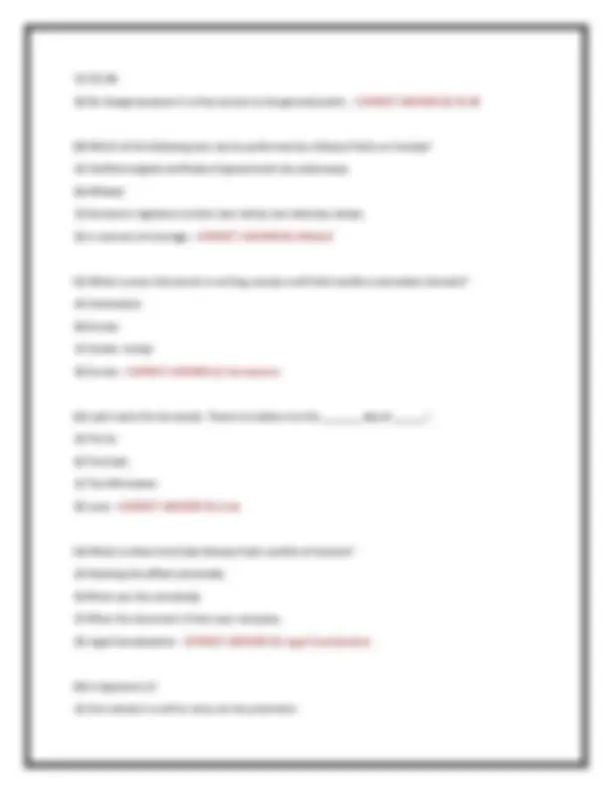
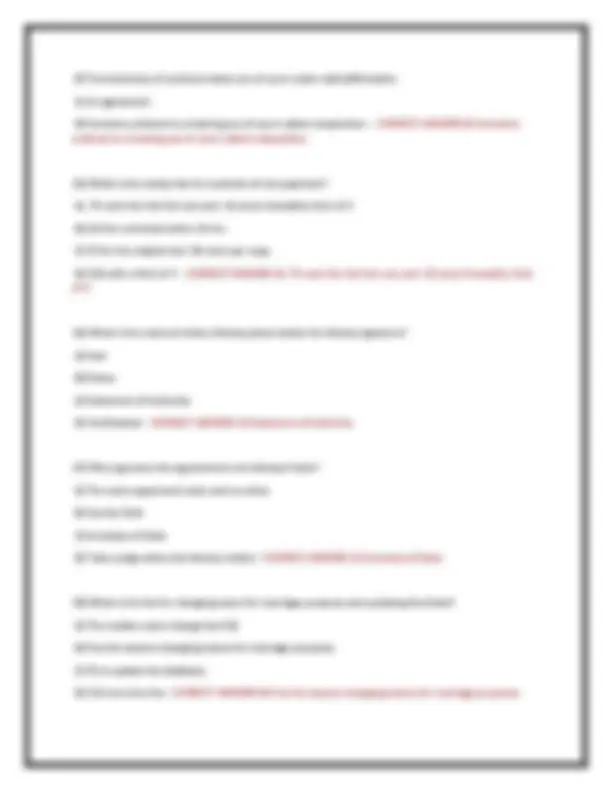
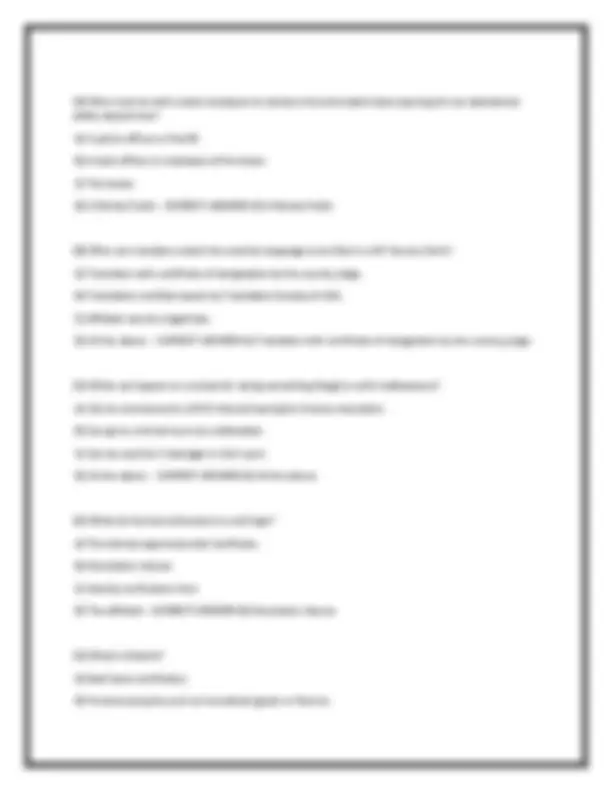
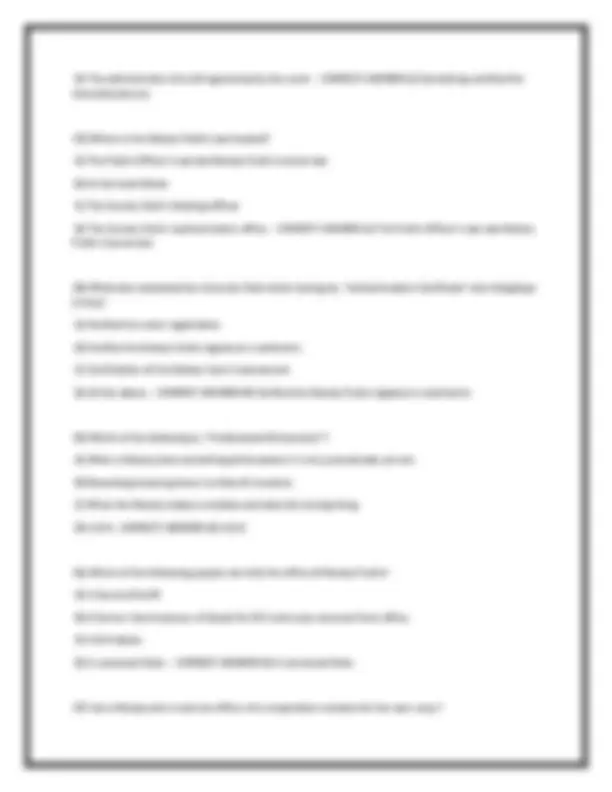
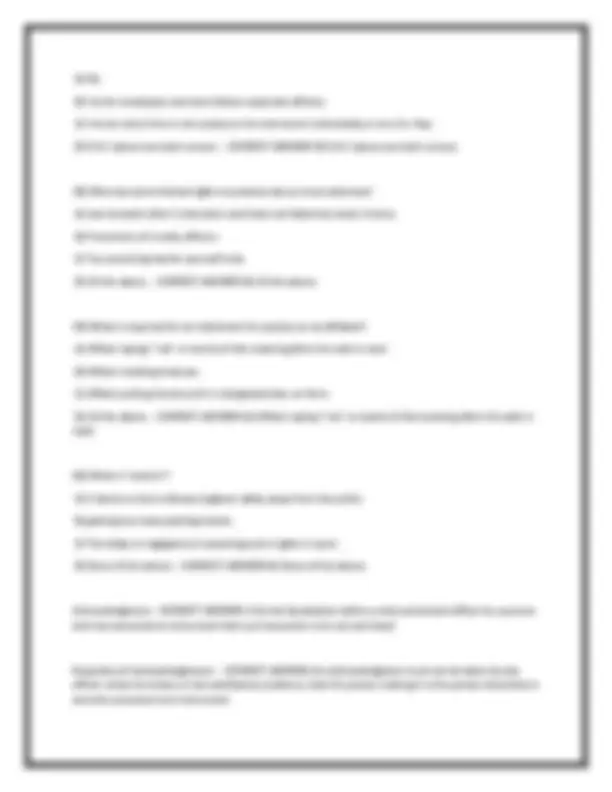
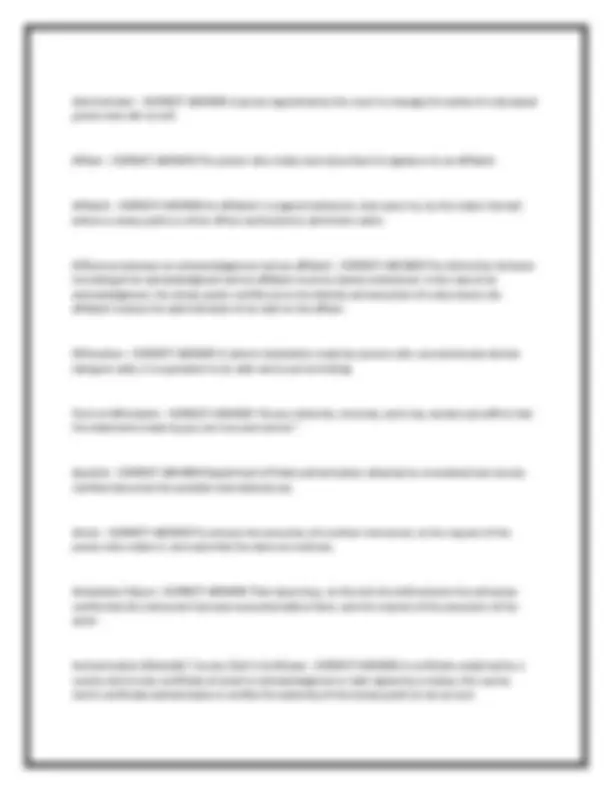
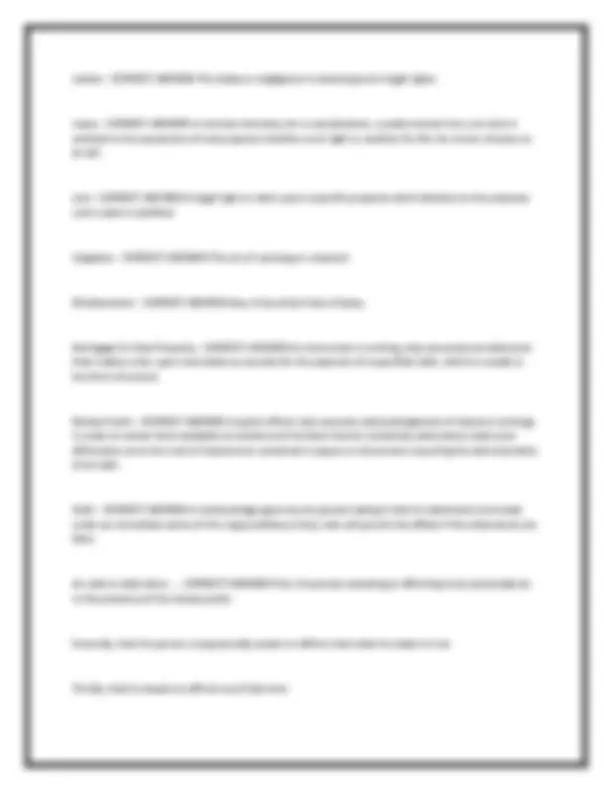
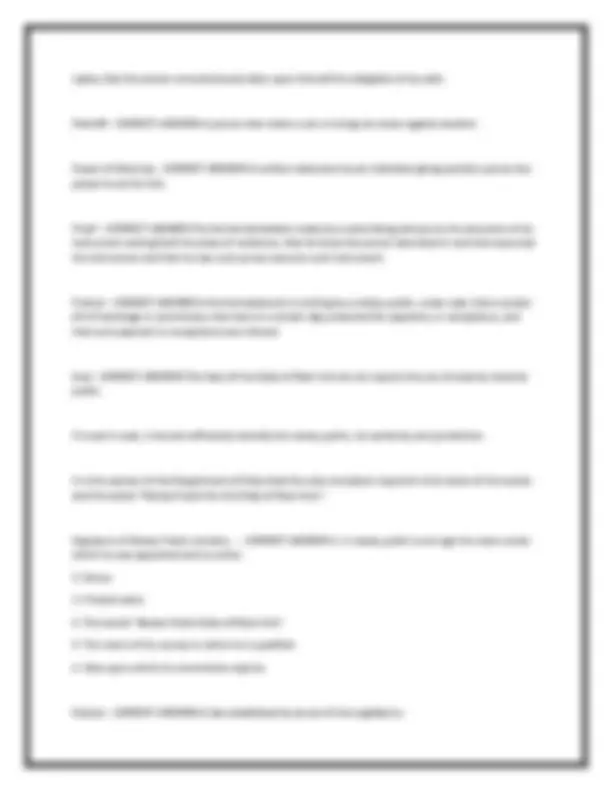
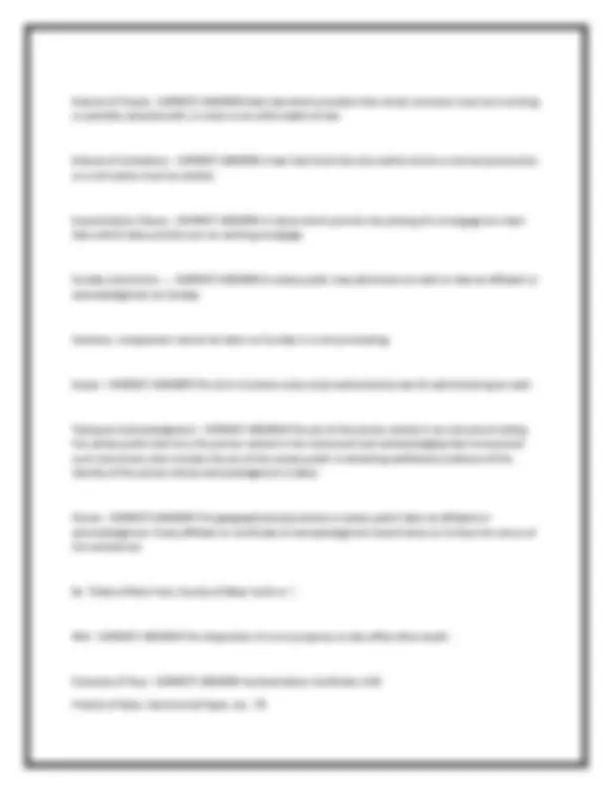


Study with the several resources on Docsity

Earn points by helping other students or get them with a premium plan


Prepare for your exams
Study with the several resources on Docsity

Earn points to download
Earn points by helping other students or get them with a premium plan
Community
Ask the community for help and clear up your study doubts
Discover the best universities in your country according to Docsity users
Free resources
Download our free guides on studying techniques, anxiety management strategies, and thesis advice from Docsity tutors
NYS NOTARY EXAM QUESTIONS ACTUAL 100 QUESTIONS WITH CORRECT DETAILED ANSWERS (100% CORRECT VERIFIED ANSWERS) A NEW UPDATED VERSION 2024-2025 |RATED A+
Typology: Exams
1 / 17

This page cannot be seen from the preview
Don't miss anything!










B) The testimony of a witness taken out of court under oath/affirmation. C) An agreement. D) Someone ordered to a hearing out of court called a deposition. - CORRECT ANSWER-D) Someone ordered to a hearing out of court called a deposition.
D) The administrator of a will appointed by the court. - CORRECT ANSWER-A) Something certified for international use.
Administrator - CORRECT ANSWER-A person appointed by the court to manage the estate of a deceased person who left no will. Affiant - CORRECT ANSWER-The person who makes and subscribes his signature to an affidavit. Affidavit - CORRECT ANSWER-An affidavit is a signed statement, duly sworn to, by the maker thereof, before a notary public or other officer authorized to administer oaths. Difference between an acknowledgement and an affidavit - CORRECT ANSWER-The distinction between the taking of an acknowledgment and an affidavit must be clearly understood. In the case of an acknowledgment, the notary public certifies as to the identity and execution of a document; the affidavit involves the administration of an oath to the affiant. Affirmation - CORRECT ANSWER-A solemn declaration made by persons who conscientiously decline taking an oath; it is equivalent to an oath and is just as binding Form of affirmation - CORRECT ANSWER-"Do you solemnly, sincerely, and truly, declare and affirm that the statements made by you are true and correct." Apostile - CORRECT ANSWER-Department of State authentication attached to a notarized and county- certified document for possible international use. Attest - CORRECT ANSWER-To witness the execution of a written instrument, at the request of the person who makes it, and subscribe the same as a witness. Attestation Clause - CORRECT ANSWER-That clause (e.g., at the end of a will) wherein the witnesses certify that the instrument has been executed before them, and the manner of the execution of the same. Authentication (Notarial) / County Clerk's Certificate - CORRECT ANSWER-A certificate subjoined by a county clerk to any certificate of proof or acknowledgment or oath signed by a notary; this county clerk's certificate authenticates or verifies the authority of the notary public to act as such.
Bill of Sale - CORRECT ANSWER-A written instrument given to pass title of personal property from vendor to vendee. Certified Copy - CORRECT ANSWER-A copy of a public record signed and certified as a true copy by the public official having custody of the original. A notary public has no authority to issue certified copies. Chattel - CORRECT ANSWER-Personal property, such as household goods or fixtures. Chattel Paper - CORRECT ANSWER-A writing or writings which evidence both an obligation to pay money and a security interest in a lease or specific goods. The agreement which creates or provides for the security interest is known as a security agreement. Codicil - CORRECT ANSWER-An instrument made subsequent to a will and modifying it in some respects. Consideration - CORRECT ANSWER-Anything of value given to induce entering into a contract; it may be money, personal services, or even love and affection. Contempt of Court - CORRECT ANSWER-Behavior disrespectful of the authority of a court which disrupts the execution of court orders. Contract - CORRECT ANSWER-An agreement between competent parties to do or not to do certain things for a legal consideration, whereby each party acquires a right to what the other possesses. Conveyance (Deed) - CORRECT ANSWER-Every instrument, in writing, except a will, by which any estate or interest in real property is created, transferred, assigned or surrendered. Deponent - CORRECT ANSWER-One who makes oath to a written statement. Technically, a person subscribing a deposition but used interchangeably with "Affiant."
Laches - CORRECT ANSWER-The delay or negligence in asserting one's legal rights. Lease - CORRECT ANSWER-A contract whereby, for a consideration, usually termed rent, one who is entitled to the possession of real property transfers such right to another for life, for a term of years or at will. Lien - CORRECT ANSWER-A legal right or claim upon a specific property which attaches to the property until a debt is satisfied. Litigation - CORRECT ANSWER-The act of carrying on a lawsuit. Misdemeanor - CORRECT ANSWER-Any crime other than a felony. Mortgage On Real Property - CORRECT ANSWER-An instrument in writing, duly executed and delivered that creates a lien upon real estate as security for the payment of a specified debt, which is usually in the form of a bond. Notary Public - CORRECT ANSWER-A public officer who executes acknowledgments of deeds or writings in order to render them available as evidence of the facts therein contained; administers oaths and affirmation as to the truth of statements contained in papers or documents requiring the administration of an oath. Oath - CORRECT ANSWER-A verbal pledge given by the person taking it that his statements are made under an immediate sense of this responsibility to God, who will punish the affiant if the statements are false. An oath is valid when... - CORRECT ANSWER-First, the person swearing or affirming must personally be in the presence of the notary public Secondly, that the person unequivocally swears or affirms that what he states is true Thirdly, that he swears or affirms as of that time
Lastly, that the person conscientiously takes upon himself the obligation of an oath. Plaintiff - CORRECT ANSWER-A person who starts a suit or brings an action against another. Power of Attorney - CORRECT ANSWER-A written statement by an individual giving another person the power to act for him. Proof - CORRECT ANSWER-The formal declaration made by a subscribing witness to the execution of an instrument setting forth his place of residence, that he knew the person described in and who executed the instrument and that he saw such person execute such instrument. Protest - CORRECT ANSWER-A formal statement in writing by a notary public, under seal, that a certain bill of exchange or promissory note was on a certain day presented for payment, or acceptance, and that such payment or acceptance was refused. Seal - CORRECT ANSWER-The laws of the State of New York do not require the use of seals by notaries public. If a seal is used, it should sufficiently identify the notary public, his authority and jurisdiction. It is the opinion of the Department of State that the only inscription required is the name of the notary and the words "Notary Public for the State of New York." Signature of Notary Public includes... - CORRECT ANSWER-1. A notary public must sign the name under which he was appointed and no other.
Ea additional Notice of Protest (limit 5) each. Oath or Affirmation 2. Acknowledgment (each person) 2. Proof of Execution (each person) 2. Swearing Witness 2. Public Officers Law - CORRECT ANSWER-Notary must not act before taking and filing oath of office. The Public Officers Law (§15) provides that a person who executes any of the functions of a public office without having taken and duly filed the required oath of office, as prescribed by law, is guilty of a misdemeanor. Class D Felony Term - CORRECT ANSWER-For a class D felony, the term shall be fixed by the court, and shall not exceed 7 years Class E Felony Term - CORRECT ANSWER-For a class E felony, the term shall be fixed by the court, and shall not exceed 4 years Misdemeanor Term - CORRECT ANSWER-A sentence of imprisonment for a class A misdemeanor shall be a definite sentence, and shall not exceed one year Forgery - CORRECT ANSWER-Class D Felony A person is guilty of forgery in the second degree when, with intent to defraud, deceive or injure another Issuing a false certificate - CORRECT ANSWER-Class E felony A person is guilty of issuing a false certificate when, being a public servant authorized by law to make or issue official certificates or other official written instruments, and with intent to defraud, deceive or injure another person, he issues such an instrument, or makes the same with intent that it be issued, knowing that it contains a false statement or false information.
Official misconduct - CORRECT ANSWER-Class A misdemeanor A public servant is guilty of official misconduct when, with intent to obtain a benefit or to injure or deprive another person of a benefit: